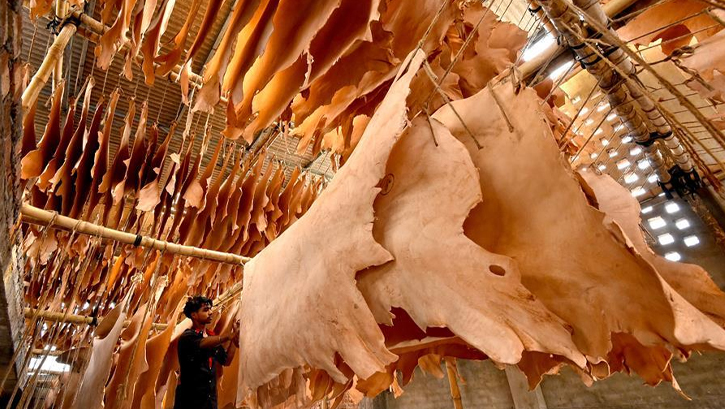
Photo: Collected
The country's leather industry has not been able to use the Savar tannery estate even though it is informed about the possibility. Despite multifaceted initiatives, there is no relief from the responsibility of environmental pollution. Naturally, this sector is lagging behind in the export market. Due to lack of proper compliance, domestic leather products are being sold at 30-40 per cent lower prices in the international market.
According to Export Promotion Bureau (EPB) data, exports of leather and leather products were worth $108.55 crore in the fiscal year 2017–18. In the financial year 2018-19, the export of leather and leather products was $101.97 crore. In the following financial year, exports fell by 21.70 per cent to $79.76 crore in 2019-20. In the fiscal year 2020-21, export earnings in this sector were $94.17 crore.
In the fiscal year 2021-22, exports increased by 32.22 per cent to $124.52 crore. However, in the following year, exports again declined. In the financial year 2022-23, the export income was $122.78 crore. In the first 10 months of the current financial year, the target was $111 crore, but the income was $87.24 crore. In the same period of the last financial year, the income in this sector was $106 crore. It can be seen that during this period, the income decreased by Tk 25 crore.
In this regard, Mohammad Nazmul Hasan Sohail, senior vice president of Leathergoods and Footwear Manufacturers and Exporters Association of Bangladesh (LFMEAB), told The Daily Messenger that exports have decreased because people in Europe are not interested in buying luxury leather products. “Global brands do not source local leather as the Central Effluent Treatment Plant (CETP) at the Savar Tannery Industrial Complex does not have a Leather Working Group (LWG) certificate. Besides, the export policy is hindering the export of leather products, thereby losing the interest of new investors.”
Stakeholders said that the leather industry is known as the second largest export income earner of the country after the garment sector. However, the role of leather industry in the country's economy could have been greater by utilising this potential sector more. But most of the country's tanneries are not able to sell leather directly to the European market due to not having the LWG certificate.
According to them, this sector is still neglected due to lack of proper planning, specific management and necessary action. This potential industry could not grow at the rate it was supposed to grow due to lack of proper planning. None of the tanneries in Savar under the control of Bangladesh Small and Cottage Industries Corporation (BSCIC) have LWG certificates.
Tannery owners and leaders also blamed the responsibility of this large industry to BSCIC. They said that BSCIC is an organisation that works with small industries. And leather is a big industry. It is natural that if the organisation dealing with small industries is given the responsibility of handling large industries, it will be average.
BSCIC was also in charge of running the CETP. It has no previous experience of running CETP. Therefore, the tannery owners said that BSCIC is not expected to have the capacity to take care of such a project. However, Dhaka Tannery Industrial Estate Waste Treatment Plant Company was given the responsibility of managing CETP two years ago. Tannery owners are not satisfied with the work of this company.
Recently, it has been seen on the ground that the central sewage treatment plant of Savar industrial city is still not fully functional. There is no permanent dump or dumping yard. Bangladesh is unable to utilise the export potential of the leather sector as compliance is not 100 per cent guaranteed.
Mizanur Rahman, vice chairman of Bangladesh Tanners Association (BTA) said, “Out of the tanneries that we have, 10 can get the certificate just by asking if CETP can properly ensure the international standards.”
Tannery owners said that none of the assurances brought to Savar from Hazaribagh have been implemented. There is a question about whether those will be implemented in the future. Due to lack of LWG certification, there is no opportunity for international buyers to come. As a result, the situation of selling leather in the international market is not being created. This project, built at a cost of more than a thousand crores, is sinking.
Messenger/Fameema








